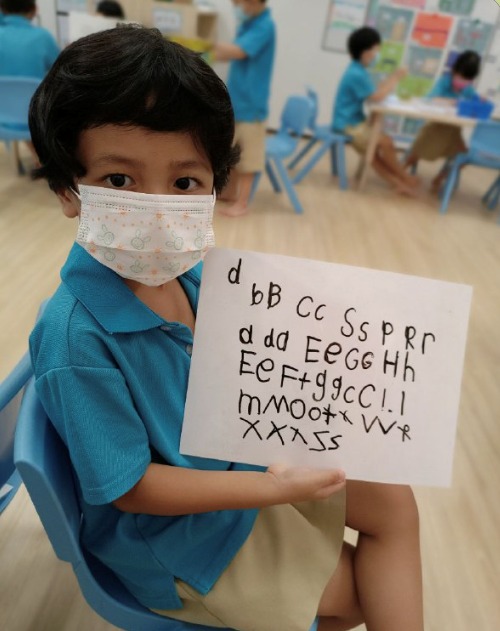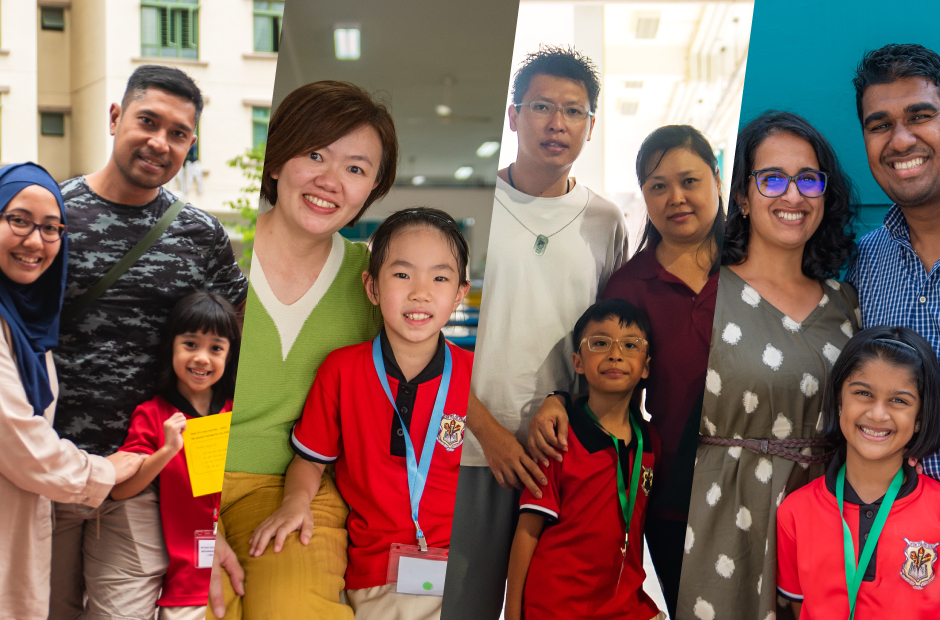Mark Rozells chuckles when he looks back of how he chose a kindergarten for his daughter three years ago.
He and his wife had seen an advertisement for an MOE Kindergarten (MK)’s Open House near their home, and signed up to take a tour of the MK.
They walked past the music room and outdoor play areas such as the water and sand play area which “were spacious, inviting and there was also an eco-garden for the children to learn about edible plants and herbs”, says Mr Rozells.
The MK also had a kitchen area, only that “it wasn’t any play kitchen, but an actual working culinary space scaled down in size for the children!” he exclaims, excited at the memory. Children learn to prepare food as one of the modular activities for KCare, a care service available in all MKs for parents who require a full-day service.
“The blender actually works, and I’m like, wow!” And just like that, they were sold.
Seeing the inviting learning areas and well-resourced learning corners, Mr Rozells, a secondary school teacher, felt that this kindergarten took play-based and experiential learning seriously, which he believes is “crucial for children at that age”. He hoped that Sophie will have a safe and conducive space to explore and discover new things.
After going through its programmes, he was pleasantly surprised to learn that there was an MK at Naval Base Primary School, which was closer to his home.
The quality and variety of activities, affordability, and location (a mere three bus stops away) matched their criteria, and so they decided to enrol Sophie in the MK.
Developinga positive attitude towards learning
The activities conducted in class are always related to the books read. “We encourage children to express themselves through various ways including writing. The children are engaged in discussions about what they can see around them, relating their personal experiences and making inferences based on pictorial cues,” says Centre Head of MK aval Base, Mdm Sitti Fatima Binte Noordin.
.jpg)
A screen capture of updates from Sophie’s MK teacher showing how the children are encouraged to reflect on and connect their learning experiences in school with their personal experiences outside school.
“I have seen Sophie happily bringing home her craft work of a spider made out of pipe cleaners and toilet rolls because it was related to a story they read in class,” Mr Rozells chuckles.
Even for classes that taught numeracy skills, the learning activities were typically based on play and hands-on activities to make learning fun. “It was not so much about -writing each letter or number perfectly, but more of getting them to attempt the activities or tasks confidently, and to learn from any mistakes they might make,” he says.
He thinks that’s why Sophie continued to be excited about learning when she entered primary school, never fearing to try. She was curious about why things were the way they were, and liked doing experiments at home and trying out simple cooking. Sophie would place her soft-toys in a ‘mini-classroom’ and pretend to be the teacher.
Keeping the family involved
At the MK, the “homework” that Sophie occasionally brought home reinforced the ‘home’ aspect — there were plenty of take-home craft activities which required parents to do things with their child, not for the child. For instance, Mr Rozells’s family made a boomerang together and decorated it, and even created musical instruments like a shaker.

“At their age, if the children did have homework to do, who does it eventually? The parents!” Mr Rozells adds with a laugh.
But seriously, he appreciates how the MK gets the family involved. “There was a concerted effort to involve the family. After a full day of school, children at that age should be spending time with their family, neighbourhood friends and just playing.
These family-based activities encouraged Sophie to update her parents on what’s happening in school, and to know when to ask them for help, and when she could cope on her own. This was an approach that was continued in the primary school, Mr Rozells notes. “In Primary 1, they had some homework – three or four problem sums – but I feel there is a clear awareness not to overtax the students, and to give them opportunities to learn, play and grow, and take care of themselves.”
Being sited in a primary school means fewer surprises
It helps that a strong focus of MKs lies in promoting children’s holistic development to prepare them for Primary 1 and ease their transition into a new environment.
As MKs are located within the premises of primary schools, the children are often taken on “tours” of the primary school to observe how the primary school students go about a regular school day and experience a small slice of primary school life for themselves.
Towards the end of Kindergarten 2, Sophie had the same opportunity, and saw how primary school students bought food all by themselves at the canteen, for instance.
“The children realise that this is what the ‘big kids’ do,” says Mr Rozells. “They learn that they must take care of things themselves… they need to know where to go… there will not always be a teacher to bring them around.” That knowledge goes a long way, as he spotted streaks of independence in Sophie.
“She could pack her own school bag, and made sure that she brought all the materials she needed for class, just like at kindergarten,” he notes. During recess, Sophie also learnt how to budget her allowance and spend the right amount of money for food, based on what she had learnt in MK.
Sophie’s primary school and student care teachers had given feedback that she takes initiative to lead and participate in the classroom or student care centre after school, helping her peers out should they need it.
Working closely with the teachers
The Rozells enjoyed the close partnership they had with Sophie’s MK teachers, and it set the stage for how they would work with her new teachers at primary school to support her better.
“As parents, our concerns were more about how Sophie would adjust to a new routine, school, teachers, and classmates,” he says. “I didn’t really have any concerns about her academic achievement, because I trusted that she would learn well after her MK experience. Even if there were going to be issues or concerns, we knew how to reach out to the primary school to find out more from there.”
Being an educator himself helps, as he recognises the significance of home-school collaboration, and understands the communication channels he can tap on. They haven’t had to do much of that, as Sophie has had few problems adjusting in Primary 1. On their own, the Rozells had helped to prepare her by practising new routines with her during the December holidays, like going to bed and waking up earlier.
Their assessment of the transition? Sophie’s MK experience has helped her become a more resilient girl. It used to be that new situations and challenges would cause her to be fearful and clam up, but now she is more confident, especially in meeting new people and making friends.
Mr Rozells recalls how there was one particular day when Sophie asked him, “How can I make friends?” After he spoke to her MK teachers about it, they tried to create more opportunities for her to interact with others.

“When she first started kindergarten, if she faced anything new, it was scary to her,” he reminisces. “There is definitely a jump as she moves to longer days at primary school, and children are expected to be more independent and proactive in asking for help if they need it. That is what I have seen, how she has become more willing and confident to try taking on something unfamiliar.”






